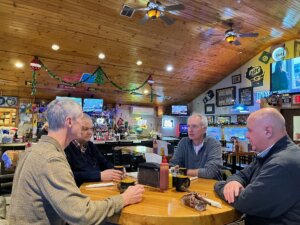Third places, where everybody knows your name: Rick Kyte
March 18, 2024
| By La Crosse Community Foundation |
Where camaraderie and connection thrive
Imagine a place beyond the familiarity of home and the routine of work that blends the comfort of the known with the excitement of the unknown. Welcome to the concept of “third places,” a term that captures the notion of those unique spaces in our lives that foster camaraderie and connection. These are places where laughter echoes, ideas flourish, and friendships forge.
But they’re so much more. They’re where social capital is formed and nurtured — combating isolation; promoting belonging, diversity, and inclusion; and creating stronger, more resilient communities.
Local author Rick Kyte, endowed professor of ethics and director of the DB Reinhart Institute for Ethics in Leadership at Viterbo University, is about to explain it in depth in his newest book, “Finding Your Third Place.” Scheduled for publication early this year, the book is based on what he’s learned in the past 15 years while teaching “Building Community,” a course in Viterbo’s Masters in Servant Leadership program.
Explain the notion of “places” and the importance of third places.

Rick Kyte (third from left) catches up with fellow community members (l-r) Ted Reilly, Tom Thibodeau, and Sam Scinta at one of his “third places,” Kramer’s Bar and Grill
The idea of the “third place” comes from the work of the late sociologist Ray Oldenburg. He wrote about the significance of the different places in our lives in “The Great Good Place,” in which he identifies home as one’s first place, work as one’s second place, and the third place as where one goes to socialize, to make friends. The “third place” is somewhere like Cheers, “where everybody knows your name.” Such places have several features in common: they are neutral ground where everybody meets as equals; they are usually filled with lively conversation and laughter; there are usually a few “regulars” who give the places much of their character; they tend to be ordinary, everyday places rather than for special occasions; and they are easily accessible, so you can just drop in at any time. Examples of third places are coffee shops, taverns, churches, gyms, public parks, libraries, pickleball courts, bookstores, and cafés.
How do third places contribute to building or strengthening social capital?
For decades, we have been designing communities with faster roads, bigger houses, more convenience, and less interaction. We have fallen into an addictive cycle, requiring more funds to maintain a vast, aging infrastructure that supports deeply unsatisfying lifestyles in which fewer people know and interact with their neighbors. Then, we spend even more money to address the problems created by social isolation: homelessness, depression, drug addiction, poor health, and domestic abuse. People who have a regular third place greatly expand their circle of friends; they laugh more often; they are more engaged in their community; they are happier; they live longer. But third places do more than just make individuals more satisfied with their lives; they also benefit entire communities by increasing social capital. Third places serve as gateways so people new to the area can get to know their neighbors; they function as incubators for new ideas; they serve as safety nets for people in crisis; they build social trust; they decrease political polarization.
What role do third places play in promoting diversity and inclusion in the community?
Diversity and inclusion are two important measures of a just and thriving society. Such a society has abundant resources that are broadly distributed, allowing individuals and groups throughout the society to flourish. One key indicator is whether children born into families with social or economic disadvantages are able to grow up to be adults who are able and willing to make meaningful contributions to the lives of others. That can be achieved in part by changing laws and policies that have created and sustained inequalities, but it also requires changes in the ways in which people interact with one another on a daily basis. Third places are where we have such daily social interactions, where we meet new people and eventually form friendships with them. Some of the most interesting social science research of the last decade reveals that communities where it is easy to make new friends have lower social and economic inequality.
Reprinted with permission from the La Crosse Tribune.
